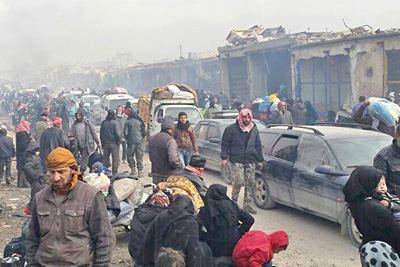
Vol. 81/No. 1 January 2, 2017
(front page)
Workers in Syria face catastrophe as Moscow, Assad seize Aleppo

Those leaving the city are the latest wave in a catastrophe for working people that has left over 400,000 dead and more than half the country’s population driven from their homes.
These events register shifts in relations among some of the main capitalist ruling classes intervening in Syria to advance their competing interests — particularly the growing alliance of the governments of Russia, Turkey and Iran. And they highlight how Washington, for decades the dominant imperialist power in the Middle East, has been increasingly pushed aside.
Since crushing popular protests for democratic rights in 2011, the Assad regime has a well-earned reputation for carrying out bloody reprisals against opponents of his rule.
Assad’s repression led to over five years of civil war. The regime suffered reverses, losing territory — including large parts of Aleppo — and found it increasingly difficult to recruit troops. But Iranian troops, Lebanese-based Hezbollah forces and Moscow air power tipped the balance against the rebellion. Because of Washington’s reluctance to offer any substantial military aid, opposition forces faced massive bombings, artillery attacks and increased ground forces with hand weapons and little else.
Ankara seeks deal with Moscow against Kurds
For years the Turkish government funded and armed many of the groups fighting Assad’s rule. But Turkish President Recep Tayyip Erdogan has shifted Ankara’s strategy, dropping efforts to depose Assad in favor of collaboration with Moscow. Ankara’s goal? To win Moscow’s backing for its attacks on Kurdish forces in Syria, Iraq and Turkey.
Turkish-backed groups pulled back from the fight in Aleppo, and instead are fighting alongside Turkish troops in northern Syria against the Kurdish People’s Protection Units (YPG).
The foreign ministers of Russia, Iran and Turkey met in Moscow Dec. 20, “leaving the United States on the sidelines as the countries sought to drive the conflict in ways that serve their interests,” the New York Times said. They agreed to broker talks in Kazakhstan to try to reach a broader cease-fire “between the Syrian government and the opposition and to become its guarantor,” said Russian Foreign Minister Sergey Lavrov.
Both Moscow and Ankara took pains not to let the meeting be derailed by the assassination in Ankara of Andrei Karlov, Russia’s ambassador to Turkey, the day before by an off-duty cop who shouted, “Allahu akbar” and “Don’t forget Aleppo.” Turkish authorities are seeking to link the gunman to U.S.-based cleric Fethullah Gulen, a former Erdogan ally who Ankara accuses of orchestrating an attempted coup in July. Tens of thousands accused by Erdogan of being agents of Gulen have been fired, jailed and “disappeared” in a brutal crackdown since.
As of Dec. 20, at least 25,000 people had been bused out of eastern Aleppo since the Russian and Turkish governments brokered a cease-fire, with many more waiting to evacuate. Most are being taken to Idlib province, which is controlled by government opponents. The dominant forces there are Jabhat Fateh al-Sham, which was formerly the al-Qaeda-linked Nusra Front, and other Islamist groups. Idlib is “not a popular destination for fighters and civilians from east Aleppo, where nationalist rebel groups predominated,” Reuters said Dec. 15.
Opposition in Idlib: ‘easy prey’ for regime
“Assad and his allies will have corralled much of Syria’s insurgency and its supporters into a small mountainous patch where they will be easy prey,” Faysal Itani of the Atlantic Council wrote in the Times Dec. 14.
Some Ankara-backed opposition combatants are being rerouted to join Turkish forces in their “Euphrates Shield” offensive against the YPG’s drive to unify Kurdish-controlled areas north of Aleppo.
The military operation was launched in August, ostensibly against Islamic State but with the open aim of preventing the YPG from extending and connecting regions under its control. Its current objective is to drive Islamic State out of al-Bab, a city 25 miles northeast of Aleppo, before the Kurds can do so.
In 2012, the Barack Obama administration threatened that any evidence Assad was using chemical weapons would cross a “red line” and Washington would intervene. But when the Syrian regime used those weapons against opposition forces in Damascus, killing nearly 1,500 people, including 400 children, the U.S. government didn’t respond. Since then, Washington’s priority in Syria has been the defeat of Islamic State.
President-elect Donald Trump has said he is not interested in increasing Washington’s military intervention, preferring efforts for a deal with Moscow.
Washington is supporting Kurdish-led Syrian Democratic Forces with airstrikes and special operations troops in the current push to retake Raqqa from Islamic State, over the Turkish government’s objections.
At the same time, U.S. officials have made clear they don’t intend to recognize any form of Kurdish sovereignty in Syria. Kurds “should not seek to create autonomous, semi-autonomous zones,” State Department spokesman Mark Toner said.
Front page (for this issue) | Home | Text-version home